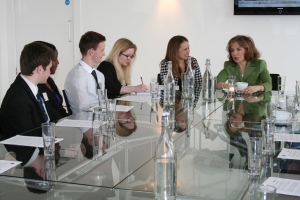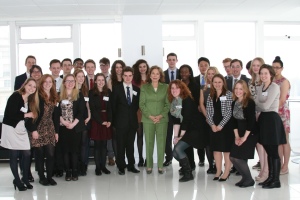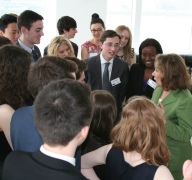James Turner reports on a discussion between students on the Sutton Trust US Programme and Mrs Heinz Kerry, wife of the US Secretary of State
There are some meetings which will live with you for a lifetime, some which give you a renewed conviction for your work and for life in general. Last week we were fortunate enough to host a round-table with Theresa Heinz Kelly –  businesswoman, philanthropist and wife of the US Secretary of State, John Kerry – for participants on our US university programme. For many of us, this was one such meeting.
businesswoman, philanthropist and wife of the US Secretary of State, John Kerry – for participants on our US university programme. For many of us, this was one such meeting.
Mrs Heinz Kerry found time in her hectic London schedule (she’d flown in the day before from Istanbul and was heading home the day after) to spend over an hour talking to our students – asking them about their own university choices and offering them advice on education and career paths. The conversation ranged widely; Mrs Heinz Kerry also gave us tantalising glimpses into a whole range of areas of her academic, philanthropic and professional life, from her efforts to combat apartheid in South Africa to her concerns for the environment. Wisdom and common sense peppered her remarks, and the consensus was she was an impressive and inspiring lady.
As the discussion closed, and Mrs Heinz Kerry was saying goodbye to the students, I reflected that this has been an extraordinary journey for the Trust, our partners the Fulbright Commission and, of course, for the young people who have been on the Sutton Trust US programme.
Eighteen months ago we were sitting in Millbank Tower planning the initiative – tea for us Brits, Diet Coke for our American colleagues – asking just what could be achieved by a non-profit in such a competitive space, and wondering whether more than a handful of our students would be successful in gaining admission. Yet here we were, in Millbank Tower again, almost 20 of our students bound for US universities this autumn, accessing millions of dollars of aid, with one of the most influential women in the world taking a genuine interest in what we’ve achieved.
For the young people themselves, many had never seriously thought about studying in the US until they saw our programme – and even then, it seemed a very distant prospect indeed. But, thanks to the exceptional efforts of those involved in running the scheme and their own sheer hard work, we now have ordinary (in the best sense of the word) state school students heading to some of the highest ranked US universities in the world. The don’t live in million pound houses or attend elite schools; they simply have talent and motivation and that has shone through.
 It is a high bar we have set ourselves for this year’s group of 150, who we’ll be taking to MIT and Yale in the summer. But having met many of those young people over Easter at our selection residential, I am confident we have a great starting point for this year’s programme. There were some exceptional young people with some incredible stories, a voracious appetite for learning and for expanding their horizons.
It is a high bar we have set ourselves for this year’s group of 150, who we’ll be taking to MIT and Yale in the summer. But having met many of those young people over Easter at our selection residential, I am confident we have a great starting point for this year’s programme. There were some exceptional young people with some incredible stories, a voracious appetite for learning and for expanding their horizons.
In fact, it wouldn’t surprise me if, amongst them, we have some future leaders of the likes of Mrs Heinz Kerry.
